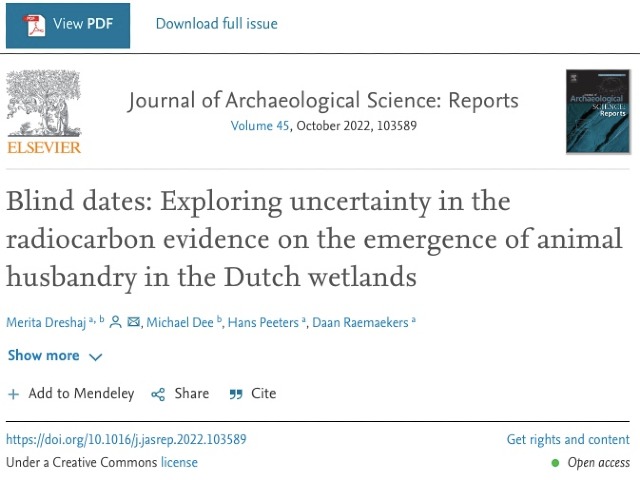Open Access Publication in the Spotlight (December) - 'Blind dates: Exploring uncertainty in the radiocarbon evidence on the emergence of animal husbandry in the Dutch wetlands'

Each month, the open access team of the University of Groningen Library (UB) puts a recent open access article by UG authors in the spotlight. This publication is highlighted via social media and the library’s newsletter and website.
The article in the spotlight for the month of December 2022 is titled Blind dates: Exploring uncertainty in the radiocarbon evidence on the emergence of animal husbandry in the Dutch wetlands, written by Merita Dreshaj, Hans Peeters, Daan Raemaekers (all from the Faculty of Arts) and Michael Dee (Faculty of Science and Engineering).
Abstract
The emergence of animal husbandry in the Netherlands remains the subject of much speculation. Challenges in identifying domesticated animals among the faunal remains, inconsistent excavation documentation, and flawed radiocarbon analysis have resulted in questionable chronologies. This paper examines the available radiocarbon evidence from selected sites which are the mainstay of early examples of domesticated animals in the Netherlands, between 5000 and 4000 BCE. We approach the legacy data in two ways: by employing principles of chronometric hygiene to reassess the radiocarbon datasets of selected sites and by exploring the use of such data for future studies in chronology by means of Bayesian chronological modelling. The latter is demonstrated with a case study, whereby we employ legacy data from Hardinxveld-Giessendam De Bruin in Bayesian models to demonstrate that, despite their shortcomings, such dates remain a valuable resource for much needed future chronological analysis.
We asked first and corresponding author Merita Dreshaj a few questions about the article:
In this article, you examined several legacy datasets, that consists of data collected during past studies. What role do legacy datasets play in your field and how easy or difficult is it to get access to these datasets?
In my field, legacy datasets are very important. We draw as much information as we can from the work of our predecessors. Archaeological sites were frequently excavated decades ago and are now inaccessible to us. Legacy datasets have the most importance in these circumstances because they can be the only source of information for our research. Accessing them is sometimes simple because they are well-published sites with well-maintained databases, for example. Sometimes, and this is true all around the world, such datasets are limited and in formats that are incompatible with modern research methods. In both cases, we make certain that we make the best use of these datasets.
Can you describe the challenges of reusing legacy datasets? Will this experience change the way you approach data collection and data management in your future field studies?
Legacy datasets are extremely diverse, as highlighted in our featured paper. The most challenging difficulty is the disparity between how people used to treat archaeological material discovered in excavations and the relatively precise approach we now have. Because a lot of multi-proxy analyses were not considered appropriate at the time, some valuable material may have been lost because it was not regarded as a worthwhile source of information. Of course, this is not true for all sites. Furthermore, understanding of the factors that affect radiocarbon dating was not as detailed as it is today, which affected the way data was obtained and, of course, how the results were interpreted. As in any other profession, we learn from experience and strive to improve our methods, which is exactly the point of our paper. We hope that our study will attract attention to good practices and raise awareness of the importance of diligent data collection.
To what extent is data loss an issue in the field of archaeology?
When it comes to archaeology, data loss can be devastating. This is due to the fact that archaeology is an inherently destructive form of research that necessitates meticulous data gathering and administration. Once the sites have been excavated, databases and associated archaeological artifacts are frequently all that is available for future research.
You are working on your PhD thesis. Do you feel there is enough attention for open science practices in your PhD programme?
We prioritize open access in our research group. In fact, all of our publications are indisputably open access, and adequate money has been set aside for this purpose. As a result, I believe we focus enough attention on this, even beyond my PhD thesis and at the institute level.
Could you reflect on your experiences with open access and open science in general?
To me, unrestricted access to research should be the norm. Data should be freely exchanged, and academic research should be a continuous discussion free of financial barriers. I am constantly astonished when I come across non-open access research and wonder why this is the case. Inadequate funding, I believe. I believe that open access should not be so expensive for authors and solely available to research groups with large research budgets. It should simply be an affordable standard for everyone. Not only because it is ethical, but also because it expands the audience and helps the authors considerably more.
Useful links:
The Digital Competence Centre (DCC) provides all UG researchers with assistance in managing their research data, throughout the entire research (data) life cycle, from grant proposal to FAIR data archiving.
Citation:
Dreshaj, M., Dee, M. W., Peeters, H., & Raemaekers, D. (2022). Blind dates: Exploring uncertainty in the radiocarbon evidence on the emergence of animal husbandry in the Dutch wetlands. Journal of Archaeological Science: Reports, 45, [103589]. https://doi.org/10.1016/j.jasrep.2022.103589
If you would like us to highlight your open access publication here, please get in touch with us.


